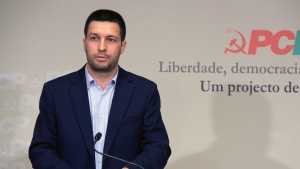The European Council meeting highlights the deep crisis in which the European Union is embroiled. Its conclusions not only do not open up prospects for overcoming the crisis in the European Union, but also embody new elements of crisis, as a result of its ever more profound militarist, neoliberal and federalist decisions.
The European Council endorsed country-specific recommendations under the European Semester procedure, which in the case of Portugal renew, among others, the pressure to reduce primary public expenditure, particularly in the health sector, alongside the increased expenditure associated with debt repayment.
The PCP vehemently rejects attempts by the European Union to constrain and impose a national fiscal and economic policy opposed to the interests of the Portuguese people and the country.
The debate on the deepening of Economic and Monetary Union (EMU) – constrained by the conclusions of the recent Franco-German summit - once again made it clear that, invoking a supposed "improvement" and "completion" of the Euro, it seeks to reinforce the constraints and impositions that limit national sovereignty, and therefore the possibility of asserting sovereign development projects based on social progress.
As the facts show, the deepening of the EMU and the Euro will inevitably represent more economic and social divergence within the Eurozone.
The implementation of the Banking Union shows the implications that its conclusion would have for the country. It is a project designed to deprive the States of control over this strategic sector, including banking supervision, diverting it from its economic and social function, and forcing monopoly concentration of the EU-wide financial sector. The proposed measures in the area of "risk reduction" and "bank resolution" confirm this assessment and stress the relative vulnerability of banking systems such as the Portuguese.
The transmutation of the European Stability Mechanism into a "European IMF" would represent the continuation and strengthening of a mechanism for economic dominance and blackmail, working in close coordination with the IMF, its practices and political conditionalities, notably in the framework of Economic and Monetary policy.
The creation of 'stabilization instruments', which supposedly aim to assist Member States in the face of inevitable asymmetric shocks, not only fails to address the underlying problems of the Euro, as it would heighten the EU's interference in sovereign decisions of Member States – beginning with the eligibility criteria for these "instruments", which represent an increased submission of States to the EU's budgetary and macroeconomic impositions – which themselves generate increasing asymmetries.
The so-called "Euro reform", if implemented, would accentuate the serious constraints and impositions already in place today, associated with the Euro and Economic and Monetary Union, when the response to the country’s problems requires, on the contrary, its liberation from these constraints and impositions.
The conclusions of the European Council point to the strengthening of the militarist and imperialist character of the European Union.
The European Union reaffirms itself as the "European pillar" of NATO, pursuing its course of militarization, conceived in accordance with the interests of its major powers - notably France and Germany - within a framework of complementarity with that agressive political-military bloc.
The PCP expresses its total opposition to the country's association with the logic of militarist, armament and interventionist escalation, that underpins the goals of creating reinforced strategic cooperation, the European Defense Fund, the expansion of the European Defense Industry Development Program and the increase in NATO military spending - which will imply an even greater abdication of elements of national sovereignty.
PCP denounces the fact that the European Union is getting ready to make significant cuts in financial resources that should be earmarked for "economic and social cohesion", while aiming at using these very same funds for militarism.
The decisions of the European Council on migration represent an unacceptable consolidation of the concept of "fortress Europe", based on an even more selective, inhumane and exploitative policy, supported by security measures, militarism and criminalization that violate the rights of migrants and refugees, fomenting xenophobic and racist attitudes.
Noteworthy is the strengthening of FRONTEX, the so-called European Coast and Borders Guard - in a new attack on fundamental elements of State sovereignty.
The so-called "landing platforms" in the southern Mediterranean basin, in countries of transit and origin constitute, as does the agreement with Turkey, a violation of international law, in particular the right of asylum. This involves the practice of creating detention camps for migrants and refugees in third countries, funded by the European Union.
The PCP reaffirms that the millions of migrants and refugees are the main victims of the policies of exploitation, warfare and plunder of resources which the EU and its powers impose in Africa and the Middle East.
Faced with the European Council’s confirmation of the decision regarding the future composition of the European Parliament, the PCP regrets and condemns the fact that the Portuguese Government (as previously the PS, PSD, CDS and BE in the European Parliament) did not oppose a proposal that harms Portugal and which does not recover - unlike most other countries - any of the losses suffered by Member States in previous enlargements. With a clear-cut defense of the national interest, this would have been both just and possible.
The recent developments in the European Union raise even more urgently the need for a Patriotic and Left-Wing Policy that ensures national sovereignty and frees Portugal from impositions and policies that are contrary to the national interest and to the interests of the Portuguese people.
